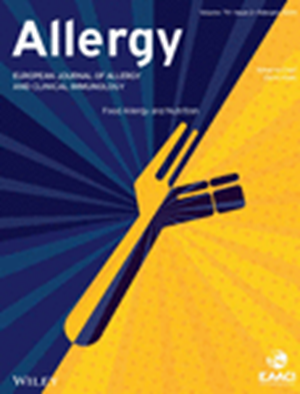Improved Transition Management of Adolescents and Young Adults With Allergy and/or Asthma: An EAACI Task Force Report on a Follow‐Up European Survey
IF 12.6
1区 医学
Q1 ALLERGY
引用次数: 0
Abstract
BackgroundAdolescents and young adults (AYA) with asthma and allergies have unexpectedly high mortality and morbidity. A survey in 2019 amongst healthcare professionals (HCPs) in Europe highlighted significant gaps in transition care, which negatively impacts patients' outcomes. Since then, an evidence‐based guideline and practical toolbox for effective transition of AYA with asthma and allergies have been published.AimsTo assess HCPs' perspectives, practice and challenges on transition care for AYA with asthma and allergies, including the impact of the recent guideline, potential differences across countries and changes since 2019.MethodsCross‐sectional online survey‐based study. European HCP managing AYA with allergies and/or asthma were invited to participate in May–June 2023.Results511 responses were collected. Amongst respondents, 60%–70% were familiar with the guideline and toolbox, and found them helpful. At least for selected patients, 50%–85% of respondents adhered to some guideline recommendations and initiatives/resources for transition care such as simplifying medication regimes, seeing AYA on their own or producing transition reports. We observed improvements compared to 2019 in areas such as prioritising transition, training, assessment of psychosocial issues and transition readiness, access to other HCP, transfer and post‐transfer feedback systems. However, 20% of respondents had no transition process and around 50% had no transition‐specific elements. Sixty percent found transition care ‘very’ or ‘moderately challenging’, with transition not being prioritised, time constraints and limited expertise on psychosocial issues as leading problems. Significant differences were observed in transition practice across countries.ConclusionDespite improvement in training and approach towards transition care, challenges and limitations persist in effectively implementing evidence‐based guidelines. Raising greater awareness about the need for, and the positive impact of high‐quality transition care amongst policy‐makers, HCP, and patients/families remains a key priority to unlock resources for training and effective implementation at a national/international level.改善青少年和年轻成人过敏和/或哮喘的过渡管理:EAACI工作组关于欧洲随访调查的报告
患有哮喘和过敏的青少年和青壮年(AYA)具有出乎意料的高死亡率和发病率。2019年在欧洲医疗保健专业人员(hcp)中进行的一项调查强调了过渡护理方面的重大差距,这对患者的治疗结果产生了负面影响。从那时起,一份基于证据的指南和实用工具箱已经出版,用于哮喘和过敏的AYA的有效过渡。目的评估HCPs对哮喘和过敏AYA过渡护理的观点、实践和挑战,包括近期指南的影响、各国之间的潜在差异以及2019年以来的变化。方法横断面在线调查研究。治疗伴有过敏和/或哮喘的AYA的欧洲HCP被邀请参加2023年5月至6月的研究。结果共收集问卷511份。在受访者中,60%-70%的人熟悉指南和工具箱,并认为它们很有帮助。至少在选定的患者中,50%-85%的受访者遵守了一些指南建议和过渡护理的举措/资源,如简化药物治疗方案,自行查看AYA或制作过渡报告。我们观察到,与2019年相比,在优先考虑转诊、培训、心理社会问题评估和转诊准备、获得其他HCP、转诊和转诊后反馈系统等领域都有所改善。然而,20%的受访者没有过渡过程,约50%的受访者没有过渡特定元素。60%的人认为过渡性护理“非常”或“具有一定挑战性”,过渡性护理没有得到优先考虑,时间有限,在心理社会问题上的专业知识有限是主要问题。各国在转型实践中观察到显著差异。结论:尽管在过渡护理的培训和方法上有所改进,但在有效实施循证指南方面仍然存在挑战和局限性。在决策者、卫生保健中心和患者/家庭中提高对高质量过渡护理的必要性和积极影响的认识,仍然是在国家/国际层面释放培训和有效实施资源的关键优先事项。
本文章由计算机程序翻译,如有差异,请以英文原文为准。
求助全文
约1分钟内获得全文
求助全文
来源期刊

Allergy
医学-过敏
CiteScore
26.10
自引率
9.70%
发文量
393
审稿时长
2 months
期刊介绍:
Allergy is an international and multidisciplinary journal that aims to advance, impact, and communicate all aspects of the discipline of Allergy/Immunology. It publishes original articles, reviews, position papers, guidelines, editorials, news and commentaries, letters to the editors, and correspondences. The journal accepts articles based on their scientific merit and quality.
Allergy seeks to maintain contact between basic and clinical Allergy/Immunology and encourages contributions from contributors and readers from all countries. In addition to its publication, Allergy also provides abstracting and indexing information. Some of the databases that include Allergy abstracts are Abstracts on Hygiene & Communicable Disease, Academic Search Alumni Edition, AgBiotech News & Information, AGRICOLA Database, Biological Abstracts, PubMed Dietary Supplement Subset, and Global Health, among others.
 求助内容:
求助内容: 应助结果提醒方式:
应助结果提醒方式:


